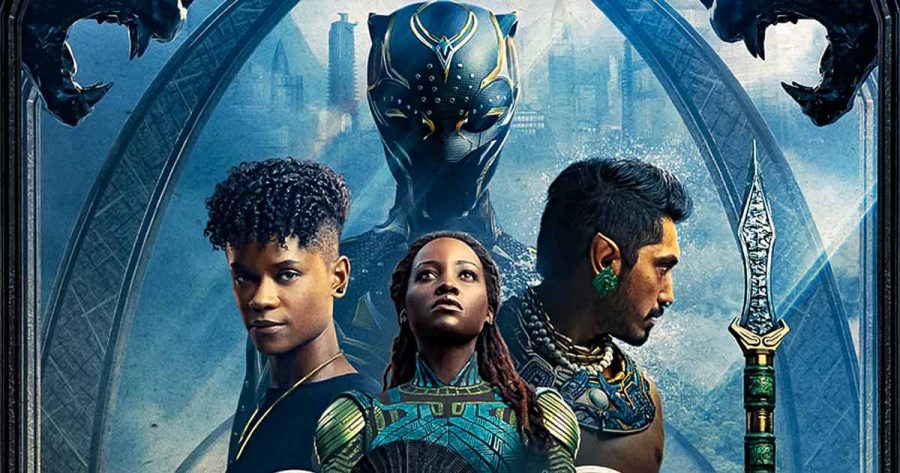Marvel fans praise ‘Wakanda Forever’
Actors Lettia Wright, Lupita Nyong’o, and Tenoch Huerta in an advertisment of ‘Black Panther’ (photo courtesy of koimoi.com0.
December 14, 2022
Since the tragic death of “Black Panther” star Chadwick Boseman in 2020, much has changed since the first airing of Black Panther in February of 2018. Post-pandemic times–as well as new additions to the Marvel Cinematic Universe such as ‘Spider-Man: Across the Spider-Verse–have set high expectations for audiences all around America.
With a budget of $250 million, director Ryan Coogler packed emotion into the 161 minutes of air time; it hit box-office records with a shocking $181 million made in the movie’s opening weekend.
Despite not being a ginormous Marvel fan myself, going into the theater, I was more optimistic about leaving with a good impression–somewhat remembering my awe after the original “Black Panther” movie. Out of the various other marvel movies, I especially recall liking that I didn’t need to have much background knowledge besides the previous movie starring Boseman.
I have always been a big believer that it is hard for a second movie to top the first one. Typically, an original is original, and whatever follows must be an attempt for filmmakers to profit. Through my experience, I soon discovered exactly why this movie in particular proves that original thought process completely wrong. No matter the movie, I already wondered: “How could I be glued to my seat for two hours and 41 minutes without falling bored?” In all honesty, the thought of a power nap in my recliner chair did cross my mind when I first sat down.
Somehow, I found myself laughing, tearing up, wanting to jump out of my chair in motivation to write the English essay I’ve been procrastinating, and rooting for the new protagonist, Shuri as she grieves for her brother all in one sitting. Multiple dialects, regions, and tribes are beautifully intertwined throughout the duration of the movie: with countless scenes leaving me in utter shock. Who could expect a backstory with an underwater birth, or on that matter, weaving in the United Nations to Wakanda?
The main storyline follows what occurs after the death of Boseman, and his character, T’Challa. He wasn’t, in fact, in various scenes as a large challenge I assume was not being able to film new content of him, but appears in flashbacks. It is this combined with new conflicts, like an international desire from multiple nations for the beloved Vibranium, that drives Shuri down a difficult path. This concept of grief not only changes how Wakanda is dictated but also causes unrest within the other tribes. Expect many unexpected plot twists in addition to the death of T’Challa, as well as a completely new enemy the Wakandans must attempt to seek peace with.
My only criticism is that some segments in the first hour were more stretched out and more disheartening than I anticipated, but I truly believe that each person in the theater was strongly affected by the powerful filmmaking skills. A wide variety of ages in the theater–middle schoolers, an elderly couple, and some families indicated just how attention-grabbing the movie aims to be.
Also to note: for one to truly appreciate all of the aspects of the movie, a decent amount of free time should be blocked off. As more minutes passed, even with my love for the storyline, I grew impatient. This was also the first time that once displaying the end credits, people weren’t fast to leave their seats, but rather sit and process, almost mourning too, for a while longer. This definitely isn’t your typical Marvel movie and I 100% recommend it to friends and family.



















![Movie poster for '[Rec]" (2007).](https://www.lionnewspaper.com/wp-content/uploads/2023/04/rec-640x900.jpg)



